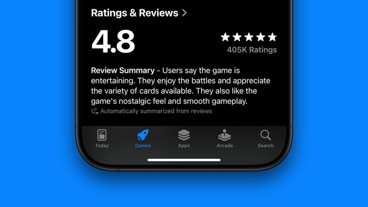This week's launch of iOS 9 also marked the debut of optional content (read: mobile ad) blockers in Apple's Safari browser. The ensuing firestorm has led to a highly emotional debate over intrusive and annoying ads, versus the need for online publishers to make money in order to stay afloat.
It's impossible for any Web publication to talk about mobile ads without some inherent bias — advertising, after all, keeps the lights on at sites like AppleInsider and countless other outlets. Without ads, frankly put, I would not have a job as the managing editor of this site. There is no purely objective way for me to write about this topic.
In recent years, advertising — Â especially on some particularly egregious mobile sites — Â has become increasingly bothersome. We've all experienced it: iPhone and iPad browsing has been plagued by popovers, slow loading times, and even some exploits that will unexpectedly force users from a website to the App Store, without even tapping on an ad.
Apple has decided to fight back with a one-two punch, offering third-party developers the ability to create their own content blocking plugins for Safari, and thus allowing users to download them and have a more pleasant, ad-free mobile experience. In the second prong of this attack, Apple is also delivering content from publishers — Â AppleInsider included — Â via iOS 9's News app.
Suffice to say that online publishers are concerned, unhappy, and downright angry with Apple about ad blockers in iOS 9. And the very livelihood of editors and writers (including yours truly) hangs in the balance.
The benefits to Apple are numerous: The company gets to provide a better experience for its users, and also in the process snub its largest competitor, and the largest online advertiser, Google. And because Safari plugins can't block ads in third-party apps, Apple wins yet again, encouraging sites to build apps from which it can collect a 30 percent cut of revenues.
The costs to online publishers from all of this are obvious as well, with the threat of severely decreased revenue if ad blockers catch on with iPhone and iPad users.
Suffice to say that online publishers are concerned, unhappy, and downright angry with Apple about ad blockers in iOS 9. And the very livelihood of editors and writers (including yours truly) hangs in the balance.
The debate over the morality of using ad blocking software, versus the arrogance of online publishers to subject their readers to copious amounts of advertisements, took a turn this week. Prominent developer Marco Arment's own ad blocking app, Peace, found its way to the top of the iOS App Store charts. But just as quickly as it rose to prominence, Peace vanished, with Arment saying publicly that he had a change of heart.
"Achieving this much success with Peace just doesn't feel good, which I didn't anticipate, but probably should have," he wrote. "Ad blockers come with an important asterisk: while they do benefit a ton of people in major ways, they also hurt some, including many who don't deserve the hit."
Peace even went as far as to block ads from Arment's own website, which drew indirect criticism from his friend, and fellow "The Deck" advertising user, John Gruber of Daring Fireball. Before he pulled the app, Arment said it would be unfair for him to make an exception for ads from the network he uses, and that Peace would apply evenly to all Web ads, not just the egregious ones.
Arment's about-face with Peace won't mean much in the long run, as there are already plenty of other ad blocking apps available for iOS 9. Nor is Apple's allowance of Safari content blockers likely to spell immediate doom for the online publishing industry.
But over time, adoption of ad blockers could continue to chip away at Web revenue. Publishers will need to either adapt, or perish.
As with most debates, the truth on this controversy lies somewhere in the middle. Mobile ads have indeed led to a subpar experience on the mobile Web, but readers who feel entitled to free content should reflect on the hard work that many websites put into their product.
I'm proud of the hard working team we have at AppleInsider. Every single day our editors tirelessly produce valuable content for our dedicated readership.
It's especially important for myself to reflect on this after the influx of Apple and technology related news in the last few weeks and months, which have seen our staff invest long hours. To say this time of year has been taxing on everyone would be an understatement.
This kind of hard work doesn't come free, which makes ads a necessary-but-unpleasant part of the Web. And if Arment's uneasiness over the ethics of ad blockers isn't shared by most end users, publishers will need to find new ways of making money, or risk going out of business entirely.
Anyone can agree that some mobile ads are exceptionally egregious and must be kept in check. But anyone who believes they are entitled to simply block ads across the board and deprive publications and their staff of advertising revenue and their very livelihood is flat-out wrong.
Changes are already afoot in online publishing. Recent months have seen consolidation in the industry, with major media companies buying up smaller properties.
Some sites have also responded to ad blockers with a more aggressive approach, displaying messages asking readers to disable their plugins, and even preventing those visitors from viewing content. Others have simply put up paywalls, charging a premium for content and severely limiting readership for an ad-free experience.
There's also been a push toward the types of ads that can't be blocked by a Safari plugin, in the form of sponsored content (or, more cynically, "advertorials"). Some websites take a more upfront approach with this content, making it clear a sponsorship is involved in the post. Other sites are less forthcoming, presenting publishers with their own moral dilemmas, and creating new headaches for readers.
The launch of iOS 9 and support for ad blockers feels like a missed opportunity for Apple to have attempted to find some much needed middle ground.
Anyone can agree that some mobile ads are exceptionally egregious and must be kept in check. But anyone who believes they are entitled to simply block ads across the board and deprive publications and their staff of advertising revenue and their very livelihood is flat-out wrong.
Finding that middle ground, where ads are present but not damaging to the user experience, is going to take time and effort, and quite frankly an overhaul of the entire online advertising industry. It's going to be difficult and painful, and it's likely that some sites won't survive the transition.
As consumers, we look to Apple to solve our problems — Â sometimes ones we didn't even know we had. This time around, Apple has made no real effort to offer publishers and users an amicable solution. iOS 9 offers no real compromises on this issue.
To be fair, that's not Apple's obligation. In the end, it will fall on publishers to create content users want to read, and to find new and different ways to monetize that content.
At AppleInsider, we can do better. I'm proud that our mobile site is very light on ads and extremely responsive. I'm also proud that our mobile app offers both non-intrusive iAd banners and an optional subscription service for an ad-free experience, allowing us to experiment with new and alternative revenue opportunities. But our desktop site needs work, and our team knows this.
It's a work in progress, and some changes have already been made recently behind the scenes. But in the end, we want to make sure that advertisements achieve an appropriate balance — Â supporting the site and allowing us to keep our paid staff, while also being respectful to you, the reader.
In the end, true peace on this issue won't come from a third-party app, or even a mediator like Apple. Publishers and readers will need to find their own peace — common ground where content is valued and readers are respected. I'm confident we'll get there.
I thank you for reading and supporting AppleInsider and being a part of our vibrant, passionate community.
 Neil Hughes
Neil Hughes









-m.jpg)






 Christine McKee
Christine McKee
 Malcolm Owen
Malcolm Owen
 Marko Zivkovic
Marko Zivkovic

 Andrew Orr
Andrew Orr
 Andrew O'Hara
Andrew O'Hara
 William Gallagher
William Gallagher





-m.jpg)



421 Comments
I think that most reasonable people will happily settle for a quid pro quo and truce if these same online publishers didn't swamp us with the crappy, creepy (as in tracking us), Flashy, in-your-face, intrusive ads that recipients are paying for via the receiver-pays data plans in countries like the U.S. You reap what you sow. Add: What are the recommendations for ad blockers for iOS?
I don't run an ad-blocker and never have. I think asking me to consider this product or that is a small price to pay for free reading material. There's nothing wrong with people simply asking you to consider their product after all. However, that's not all the advertisers ask of you these days. They also track you, and that poisons the well for me. It changes my opinion of online ads from something that, while annoying at times, is essentially benign, to something more sinister. Tracking is something the police should do to crooks, it's not something ordinary people should have done to them. And that I think is what has prompted Apple's response. New technology enables new things (as it always has) and the advertisers have gone too far. I have not installed iOS 9 yet, but if the News app lets me read AI, while viewing ads, but tightly controlled ads with no tracking, I would be a happy man. p.s. kudos to the author for being open about his position and discussing it, instead of just not mentioning it, which was another option he had.
Tough. If web publishers wouldn't clutter up their sites with relentless ads-after-ads and web "kick outs" (ie you go to a site and it kicks you to some random game in the App Store) I'd hazzard a guess that people would be more than willing to put up with an ad here and there. As it stands now I'll use things like AdBlock and others and do so happily sans remorse. I will however add that the ads I see here a fairly minimal and I have AdBlock turned off as a result.
The best kind of ads, I think, from a reader's perspective, were the early versions of Google's text-only Adsense ads in the mid-2000s - informative, non-intrusive and didn't take up much computing resources.
Your article, just like Nilay Patel's on The Verge, misses one important point. I do not mind ads (unless they are completely unacceptable, like Flash, auto-playing audio etc.).
But I do mind tracking and behavioral analysis. Give me ads without that, and I am more than willing to watch them. If there would be some .org outfit that maintains a list of non-tracking etc. ad engines, I would not mind white-listing those in general, or buy an ad blocker that generally ignores these. But, there isn't.
Most site owners make the comparison to print and tv ads, hiding the fact that these are not at all the same. No print or tv ad tracks where I was before, were I go next, how long I look at it, how fast I scroll etc. The comparison is just plain wrong.
I know that publishers are not to blame, but the pressure on the ad networks and their software can only come from them.